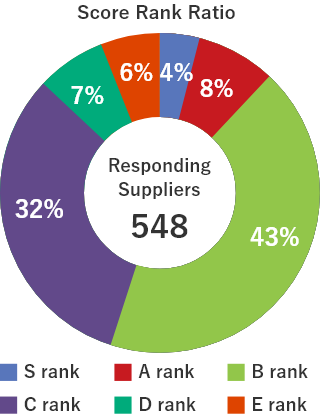The number of overseas suppliers has rapidly increased as we have expanded our businesses overseas. Under such circumstances, we have confirmed the status of operation of the Oji Group Sustainability Action Guidelines for Supply Chains and the Wood Raw Material Procurement Guidelines. We have also conducted sustainability surveys for main suppliers since FY2020.
The Sustainability Committee, consisting of the CEO as chairperson, directors with executive responsibility, and independent non-executive directors, manages this survey program.
| Targets |
|
|---|---|
| Results |
|
We conducted a sustainability survey of 213 suppliers of 'fossil fuels and secondary materials (film substrates, inks, etc.)' in FY2022, in addition to the suppliers of 'recovered paper, pulp, processed base paper, chips, chemicals and fuels (PKS, RPF, etc.)' conducted up to FY2021, and received 120 responses. The 895 suppliers cumulatively from FY2020 to FY2022, and the score rank of responding suppliers 548 (response rate: approx. 61.2%) are as follows.
We surveyed using a questionnaire-based approach with eight items comprising ESG perspectives. The overall average score for all eight items, including Corporate Governance, Human Rights, and Labor, was 481 out of 800 and was approximately 60% of the 800 scores.
The highest average score was 68 in labor, while the lowest average score was 53 score in corporate governance.
Furthermore, of the results of the 2022 responses, ten rank D companies and three rank E companies.
We also conducted a sustainability survey on wood pulp contained in purchased base paper (procured from base paper manufacturers).
Engagement and future actions.
When we provide feedback on the results of our supplier sustainability surveys, we provide development program that includes requests to comply with and implement the items listed in the Oji Group Sustainability Action Guidelines for Supply Chains in an effort to continually improve. We will work to improve the response rate and we will continue to assess suppliers whose scores are significantly lower than the average, and we will also subject important suppliers to human rights and environmental due diligence in a step-by-step manner.
| Score Rank | Score Renge | No. of Suppliers |
|---|---|---|
| S | ≧750 | 24 |
| A | <750 - ≧650 | 45 |
| B | <650 - ≧500 | 235 |
| C | <500 - ≧250 | 175 |
| D | <250 - ≧100 | 37 |
| E | <100 | 32 |
| Total | 800 | 548 |

In fiscal 2022, we conducted a survey on the legality of the wood used in the wood pulp contained in the purchased base paper (procured by the base paper manufacturer), which had not been subject to previous surveys.
Of the 570 brands of base paper purchased, 526 brands (92.3%) used the wood for which forest certification, etc. were acquired and legality verified.
In regard to the brand for which the origin of the wood used has not been identified, we will replace them with brands of base paper for which the legality of the wood used has been verified, by the end of FY2023.
| Number of brands | % | Remarks | |
|---|---|---|---|
| Base paper purchased | 570 | 100% | |
| <Breakdown> | |||
| Base paper for which the legality of the wood used has been verified | 526 | 92.3% | Forest certification, etc. acquired |
| Base paper for which the origin of the wood used has not been identified | 5 | 0.9% | To be replaced in FY2023 |
| others | 39 | 6.8% | Customer specified base paper |
We extracted the following (1) to (3) for issues related to human rights.
We will request suppliers that fall under (1) to (3) to take into active consideration (take actions for) the protection of human rights, the rights of laborers, etc. based on the Oji Group Sustainability Action Guidelines for Supply Chains through feedback of the survey results. We will also implement Human Rights Due Diligence step by step for main suppliers.

